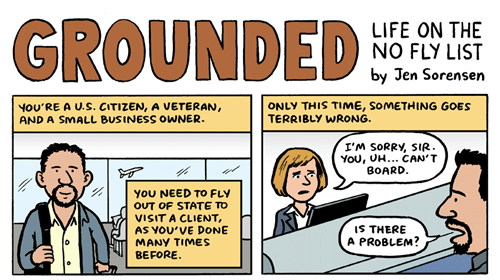
Update (10/3/14): The federal judge decided in court today that our clients will be notified by January whether they are on the No Fly List or not. Those who are still on the list will also be told why, so they can challenge their placement.
The procedure for challenging bans on air travel was deemed unconstitutional three months ago by a federal judge – but it's still in place.
Although the government has committed, in a lawsuit brought by the ACLU, to revamping the process for challenging inclusion on the No-Fly List, critical questions remain unanswered. We still don't know whether the new system will satisfy due process requirements, why the government has barred our clients from flying, and when they will have their long-awaited opportunity to clear their names and see their rights restored. We will be in court tomorrow seeking answers to these and other questions.
In the landmark ruling striking down the government's system for challenging inclusion on the No-Fly List, the court didn't pull any punches. The system, the federal court in Oregon concluded, "falls far short of satisfying the requirements of due process" and is "wholly ineffective." Without proper notice of the reasons for inclusion on the list and an opportunity to contest those reasons, the court said, "an individual could be doomed to indefinite placement on the No-Fly List."
That's precisely our clients' experience.
See this comic for a more detailed illustration of what life on the No-Fly List looks like »
The court set out the basic requirements for remedying these constitutional violations, and it asked for input from us and the government on the specific steps that should now be taken. In two court filings (here and here), the government said it wanted to devise new procedures on its own, adding that it would "endeavor to increase transparency" for people who are denied boarding on flights and believe they are on the No-Fly List. It asked the court to send our clients' cases back to the government for reconsideration under the yet-to-be devised new procedures.
There are several problems with this proposal. As we argued to the court, the government shouldn't be given a free hand to replace a process that the court has found so grossly deficient. It makes little sense for our clients to go through a time-consuming new redress process if that process doesn't meet the requirements of the Constitution. It's also not enough for the government to simply "increase transparency"; it must stop violating our clients' rights and fully and quickly comply with the court's order.
We have good reason to think that the government won't adequately fix these problems on its own. Since the court issued its order in June, we've learned more about the government's broken watchlisting system. The National Counterterrorism Center's leaked Watchlisting Guidance shows that the government's standards for placing people on various watchlists are ambiguous, overbroad, and shot through with exceptions. It's no surprise that the number of people the government watchlists has sky-rocketed, or that the rate at which the government targets members of religious and other minority groups is disproportionate in the extreme.
Our clients filed their case over four years ago, and they're still waiting for a chance to clear their names and get off the No-Fly List. As the court stated in its June ruling, "Due to the major burden imposed by inclusion on the No-Fly List, Plaintiffs have suffered significantly."
We'll be pressing for them to receive soon what the Constitution requires: notice of the basis for their placement on a blacklist that has had devastating consequences for their personal and professional lives, and a meaningful opportunity to challenge it.
Learn more about the no-fly list and other civil liberties issues: Sign up for breaking news alerts, follow us on Twitter, and like us on Facebook.
Stay informed
Sign up to be the first to hear about how to take action.
By completing this form, I agree to receive occasional emails per the terms of the ACLU's privacy statement.
By completing this form, I agree to receive occasional emails per the terms of the ACLU's privacy statement.

